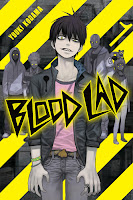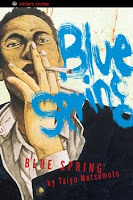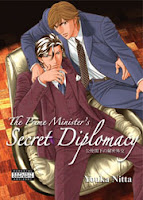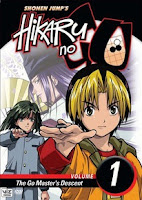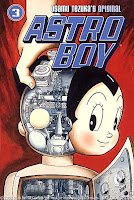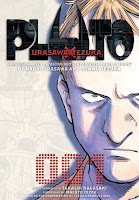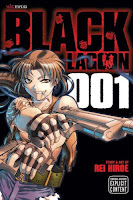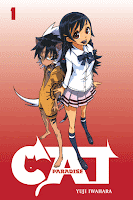My News and Reviews
There were three posts at Experiments in Manga last week, only two of which were mine. First up was my review of Negi Banno’s S.S. Astro, Volume 1, a yonkoma manga about a group of young, twenty-something high school teachers. Sadly, the series was canceled before a second volume could be released. The review is the second manga for my Year of Yuri review project. My other post last week is a part of my continuing efforts to track down manga podcasts. Discovering Manga: Podcasts, Part 3 takes a look a three ongoing podcasts that started in 2013. Also last week, I was happy to welcome Jocilyn Wagner as a guest to Experiments in Manga with her review of Hiroki Ugawa’s Shrine of the Morning Mist, Volume 1.
On to interesting things found online! Alexander Hoffman posted a Lessons from the Crater Project over at Manga Widget, which is a great summary of the events surrounding the Kickstarter project for Osamu Tezuka’s The Crater. The Daily Dot has an excellent overview of the debate over Zoë Hange gender in Attack on Titan, which has apparently become rather heated in some circles. Opening Ceremony took time to talk to the wonderful folks behind Massive—New-to-OC Brand MASSIVE on Husky Gay Asian Erotica. I also particularly enjoyed reading Tony Yao’s post The Beautiful Negativity of Seinen over at Manga Therapy.
One last thing: Usamaru Furuya’s birthday is on January 25. In honor of that, I’m declaring this week Usamaru Furuya Week at Experiments in Manga. Basically, it’s an excuse for me to get around to reviewing the rest of his manga, which I’ve been meaning to do ever since I hosted the Usamaru Furuya Manga Moveable Feast a couple of years ago. So, I’ll be posting a whopping five reviews this week! I hope you enjoy.
Quick Takes
 Arisa, Volume 12 by Natsumi Ando. Since its beginning Arisa has gone through so many disconcerting twists and turns, how is it possible that the twins look so utterly happy on the cover of the final volume? For the most part, I was satisfied with the ending of Arisa. Things aren’t resolved as happily as the cover might imply, which I find appropriate considering the darker aspects of the story. And I wouldn’t want everything to be tied up neatly. Once again though, some of the plot twists are a little ridiculous and over-the-top. I’m all for heightened drama, but I also like it to at least make some logical sense. Admittedly, Arisa can be a bit of a mess. Even so, I really enjoyed reading the series. Also included in this volume is a rather silly side story that takes place before the events of the main series. In this case it’s Arisa posing as her sister instead of the other way around. The results are amusing though not particularly believable. Granted, at this point I’m not expecting Arisa to be particularly believable anyway.
Arisa, Volume 12 by Natsumi Ando. Since its beginning Arisa has gone through so many disconcerting twists and turns, how is it possible that the twins look so utterly happy on the cover of the final volume? For the most part, I was satisfied with the ending of Arisa. Things aren’t resolved as happily as the cover might imply, which I find appropriate considering the darker aspects of the story. And I wouldn’t want everything to be tied up neatly. Once again though, some of the plot twists are a little ridiculous and over-the-top. I’m all for heightened drama, but I also like it to at least make some logical sense. Admittedly, Arisa can be a bit of a mess. Even so, I really enjoyed reading the series. Also included in this volume is a rather silly side story that takes place before the events of the main series. In this case it’s Arisa posing as her sister instead of the other way around. The results are amusing though not particularly believable. Granted, at this point I’m not expecting Arisa to be particularly believable anyway.
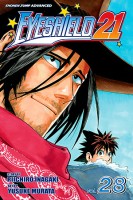 Eyeshield 21, Volumes 28-31 written by Riichiro Inagaki and illustrated by Yusuke Murata. I’ve discovered that, for some reason, I really like sports manga, even when that sport is something that I’m not particularly interested in in real life. For example, American football. Yet here I am thoroughly enjoying Eyeshield 21, completely caught up in the Deimon Devil Bats’ fight to reach the Christmas Bowl. And a fight it is. These volumes focus on the game between the Devil Bats and the Hakushu Dinosaurs with an emphasis placed on football as a combat sport. (I’ve actually never really thought of football that way before, so that was an interesting take on the sport for me.) The Dinosaurs have a habit of intentionally sending their opponents to the hospital, so it’s a fairly rough game. The face-off between the two teams also shows just how far Sena has come as a player since the beginning of the series. Once a weakling pushover, he’s now become much more confident in his abilities and in himself. I’m very excited to read more of Eyeshield 21.
Eyeshield 21, Volumes 28-31 written by Riichiro Inagaki and illustrated by Yusuke Murata. I’ve discovered that, for some reason, I really like sports manga, even when that sport is something that I’m not particularly interested in in real life. For example, American football. Yet here I am thoroughly enjoying Eyeshield 21, completely caught up in the Deimon Devil Bats’ fight to reach the Christmas Bowl. And a fight it is. These volumes focus on the game between the Devil Bats and the Hakushu Dinosaurs with an emphasis placed on football as a combat sport. (I’ve actually never really thought of football that way before, so that was an interesting take on the sport for me.) The Dinosaurs have a habit of intentionally sending their opponents to the hospital, so it’s a fairly rough game. The face-off between the two teams also shows just how far Sena has come as a player since the beginning of the series. Once a weakling pushover, he’s now become much more confident in his abilities and in himself. I’m very excited to read more of Eyeshield 21.
 Hetalia: Axis Powers, Volumes 4-5 by Hidekaz Himaruya. I know just as many people who absolutely hate the Hetalia franchise as I do people who absolutely love it. I wouldn’t necessarily call myself a rabid fan, but it is a series I follow. I do, however, generally prefer the anime adaptation over the original manga. For some reason, even though the anime and the manga both make the same jokes, I find the anime to be funnier. There are times that I just can’t seem to figure out what the punchline is supposed to be in the manga. The manga still can make me laugh, though, and I even occasionally learn a bit of history in the process, which I appreciate. The number of countries involved in Hetalia continues to grow with these volumes, including more female personifications which is nice to see. The Netherlands in particular seems to get a fair amount of page time this time, too. Hetalia does rely heavily on stereotypes for its humor, but I don’t get the feeling that they’re being used maliciously or to be deliberately offensive.
Hetalia: Axis Powers, Volumes 4-5 by Hidekaz Himaruya. I know just as many people who absolutely hate the Hetalia franchise as I do people who absolutely love it. I wouldn’t necessarily call myself a rabid fan, but it is a series I follow. I do, however, generally prefer the anime adaptation over the original manga. For some reason, even though the anime and the manga both make the same jokes, I find the anime to be funnier. There are times that I just can’t seem to figure out what the punchline is supposed to be in the manga. The manga still can make me laugh, though, and I even occasionally learn a bit of history in the process, which I appreciate. The number of countries involved in Hetalia continues to grow with these volumes, including more female personifications which is nice to see. The Netherlands in particular seems to get a fair amount of page time this time, too. Hetalia does rely heavily on stereotypes for its humor, but I don’t get the feeling that they’re being used maliciously or to be deliberately offensive.
 White Brand by Youka Nitta. Although I didn’t realize it until reading the afterword, apparently White Brand was Nitta’s first collection of boys’ love short stories. I’ve now read several of Nitta’s manga, but it seems that they tend to be fairly hit-or-miss for me. Despite Embracing Love actually being one of my favorite yaoi series, none of Nitta’s other works have really grabbed me. That hasn’t especially changed with White Brand, though I did like it more than The Prime Minister’s Secret Diplomacy. White Brand collects five short boys’ love manga. I’m not sure if it was an intentional or not, but a recurring theme throughout most of the stories is opposites. “White Brand” is about cousins with different color skin tones. “Teal End” is about two men from different countries. “Exhibition Painting” features men from very different classes and walks of life. “One Size Fits All” is somewhat frivolous story about a tall model and a much shorter man. “Hasta la Vista, Baby” is the only story that this play on opposites isn’t immediately obvious.
White Brand by Youka Nitta. Although I didn’t realize it until reading the afterword, apparently White Brand was Nitta’s first collection of boys’ love short stories. I’ve now read several of Nitta’s manga, but it seems that they tend to be fairly hit-or-miss for me. Despite Embracing Love actually being one of my favorite yaoi series, none of Nitta’s other works have really grabbed me. That hasn’t especially changed with White Brand, though I did like it more than The Prime Minister’s Secret Diplomacy. White Brand collects five short boys’ love manga. I’m not sure if it was an intentional or not, but a recurring theme throughout most of the stories is opposites. “White Brand” is about cousins with different color skin tones. “Teal End” is about two men from different countries. “Exhibition Painting” features men from very different classes and walks of life. “One Size Fits All” is somewhat frivolous story about a tall model and a much shorter man. “Hasta la Vista, Baby” is the only story that this play on opposites isn’t immediately obvious.
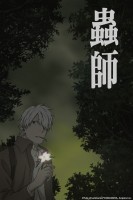 Mushishi: Sun-Eating Shade directed by Hiroshi Nagahama. I won’t lie—I love both the Mushishi manga and the anime. I was very excited when the special episode was announced and thrilled when Crunchyroll picked it up so that I could actually watch it. Although about twice as long as the individual episodes of the anime series, Sun-Eating Shade matches the tone, atmosphere, and ambiance perfectly. I was very happy to see that the same animation style was kept for the special episode. The backgrounds are still gorgeous, the music is still haunting, the pacing is still relaxed and unhurried. Mushishi has always been a rather episodic series, but I liked how Sun-Eating Shade made references to and loosely tied together several stories adapted in the first season of the anime. If someone didn’t enjoy the original anime series, there is nothing in Sun-Eating Shade that will change their mind. But established Mushishi fans (like me) probably won’t be disappointed with the special episode. I’m looking forward to the second season of Mushishi a great deal.
Mushishi: Sun-Eating Shade directed by Hiroshi Nagahama. I won’t lie—I love both the Mushishi manga and the anime. I was very excited when the special episode was announced and thrilled when Crunchyroll picked it up so that I could actually watch it. Although about twice as long as the individual episodes of the anime series, Sun-Eating Shade matches the tone, atmosphere, and ambiance perfectly. I was very happy to see that the same animation style was kept for the special episode. The backgrounds are still gorgeous, the music is still haunting, the pacing is still relaxed and unhurried. Mushishi has always been a rather episodic series, but I liked how Sun-Eating Shade made references to and loosely tied together several stories adapted in the first season of the anime. If someone didn’t enjoy the original anime series, there is nothing in Sun-Eating Shade that will change their mind. But established Mushishi fans (like me) probably won’t be disappointed with the special episode. I’m looking forward to the second season of Mushishi a great deal.

